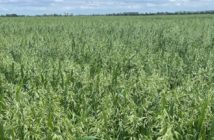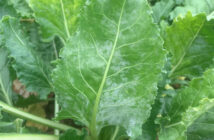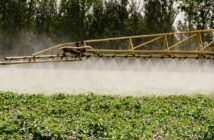Elsoms Seeds, the UK’s leading independent plant breeder, seed supplier and seed treatment specialist, has been working closely with Warwick University on another productive and inspirational Knowledge Transfer Partnership (KTP). The project, which concludes in September 2016, is investigating sclerotinia in swede and mildew in certain herb species.
Both diseases are a significant cause for concern to UK growers at present and frequently lead to a substantial loss of yield. Sclerotinia, a necrotrophic fungal pathogen, causes rotting in the field as well as in storage. It can remain in the soil for up to a decade and is extremely hard to eradicate. Mildew is a destructive foliar disease that spreads very quickly in warm conditions, a particular problem for UK species grown under glass. The Elsoms plant breeding team are eager to help support UK growers to find solutions to these issues and will incorporate the results of the KTP into their breeding programmes to create new disease resistant varieties.
Plant Genetics and Crop Improvement graduate, Roseanne Maguire, has been based at Elsoms Spalding site for the last 2 years. As well as delivering significant insights into the pathology of both diseases, the knowledge transfer has ensured that cutting edge resources and facilities, industry knowledge and university expertise have been embedded into the Elsoms plant breeding team. At the same time, Elsoms has invested heavily in its plant breeding facilities and the team now has a new pathology lab, growing rooms, a microbiological cabinet, a minus twenty degrees freezer, and a refurbished glasshouse with LED lighting and an automatic watering system at their disposal.
The results and methodologies established and embedded during the KTP, combined with the new facilities, will benefit both the company and its customers, increasing the plant breeding team’s ability to breed disease resistant varieties. Their aim for the future is to use this knowledge to breed ever-greater numbers of solid, innovative and market-leading varieties, bred and tested for the conditions and regions in which they will be required.
Sue Kennedy, Head of Plant Breeding at Elsoms said,
“Rosanne’s results have been inspiring, enlightening and incredibly useful. The knowledge gained has already been a considerable boost to our existing breeding programmes and will also help us to bring new disease resistant varieties into the market place to benefit growers in the UK and overseas.”
Elsoms Seeds is supportive of Knowledge Transfer Partnerships and recognise considerable value in the mutual exchange of specialist information and expertise between graduates from the country’s leading research institutions and Elsoms own professional, experienced teams. The partnerships allow graduates to obtain “real world” experience of spearheading research campaigns within the agricultural technology industry, whilst building on the contemporary methodologies, facilities and expertise already operational within the organisation.
As well as supporting KTPs, Elsoms has many other relationships with leading research institutions in the UK and overseas; at any time contemporary student research ranges from A Level to undergraduate dissertations and on to PhD level, with many projects running concurrently. Work with Warwick University has been a particularly strong influence since the 1980’s, when the two organisations collaborated on the incredibly successful and ground-breaking first seed priming trials. Seed priming is now recognised as a key part of the growing process, widely used across the industry, and Elsoms has become one of the UK’s leading providers of this service.
Robin Wood, MD of Elsoms added,
“I’m incredibly proud of the energy and enthusiasm our teams bring to their work and the way they combine the friendly outlook and professional traditions of a long-established business with the innovation and vitality of new ideas from academia. This constant contact with young specialists and their research institution support networks is incredibly important and really helps drive progress in our industry.”



